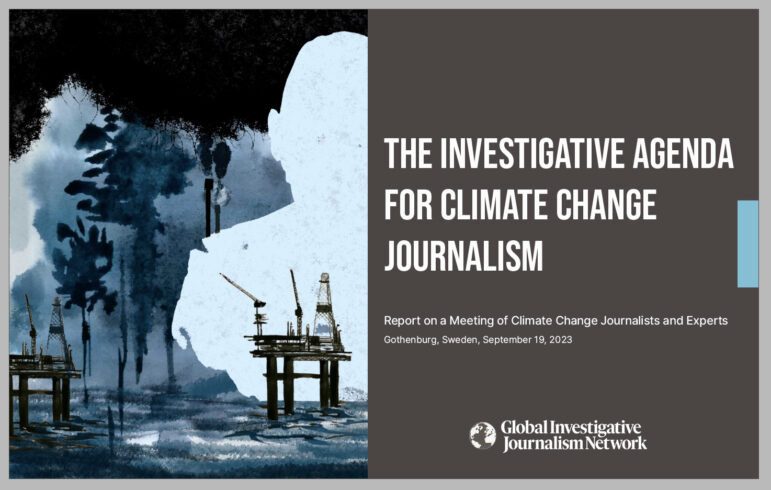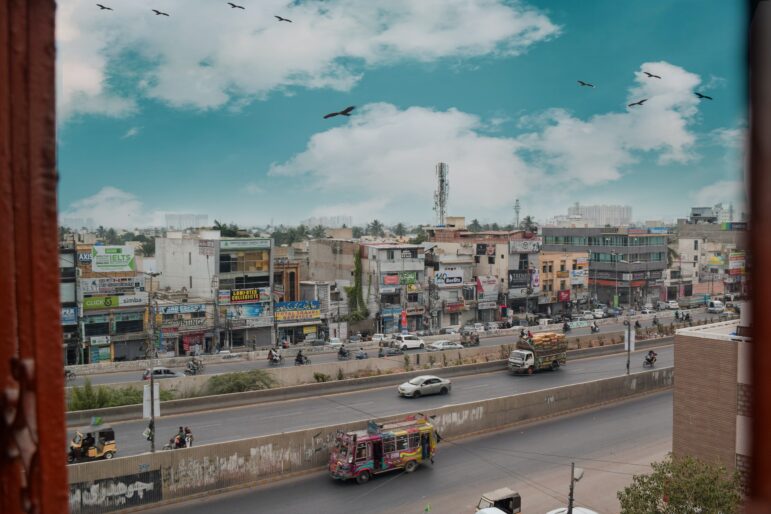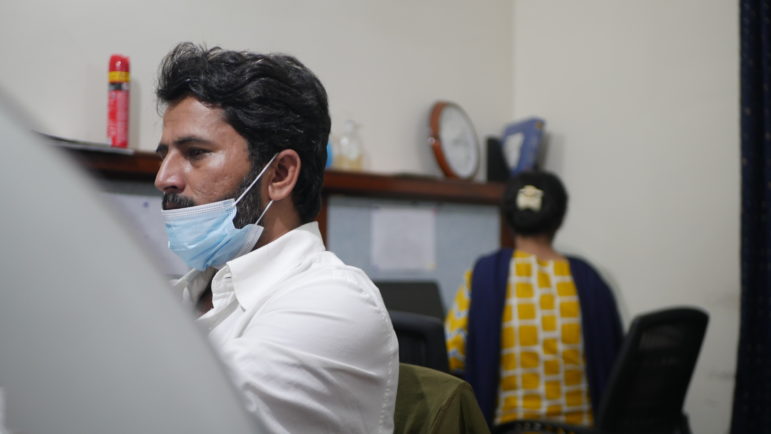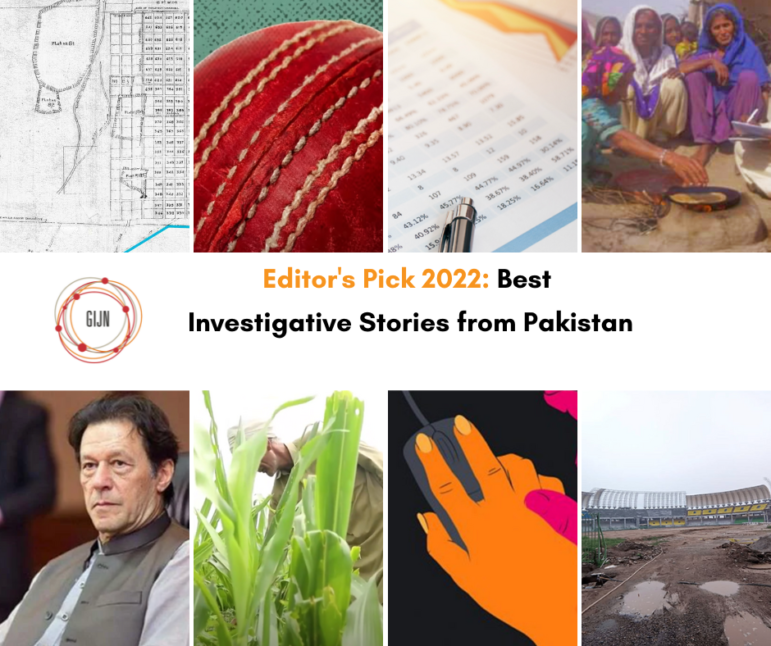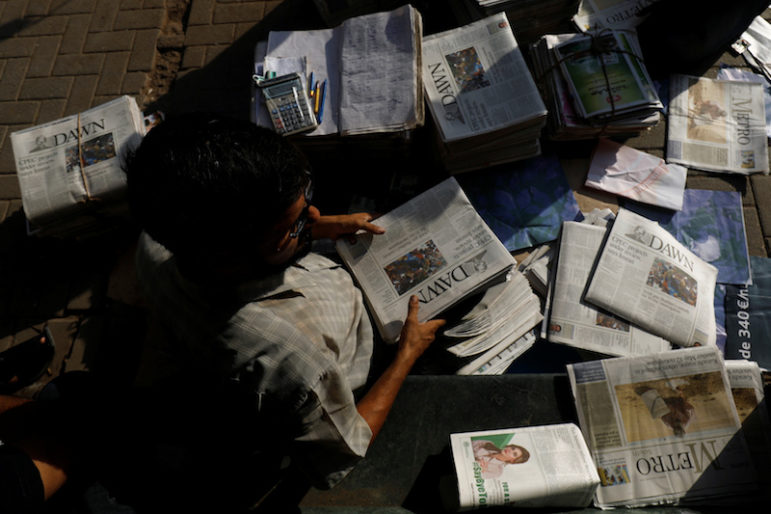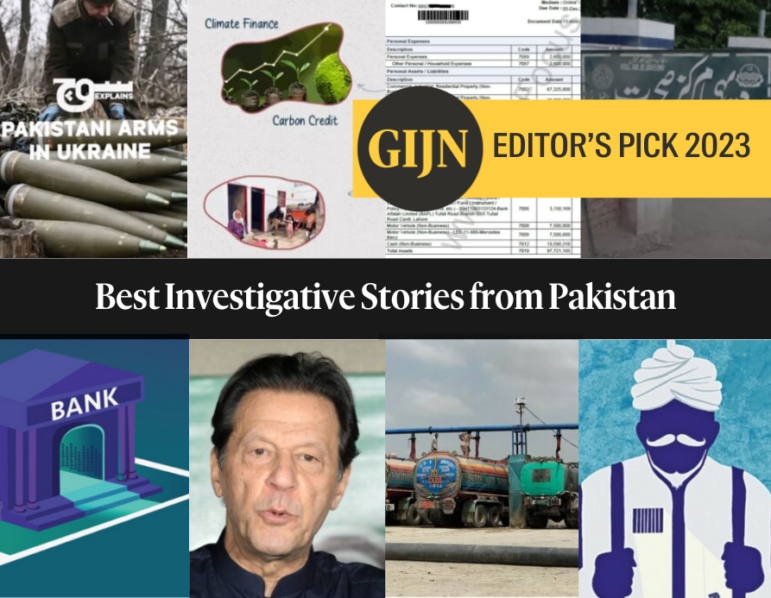

Image: GIJN
Private Prisons, Water Mafia, Arming Ukraine: 2023’s Best Investigative Stories from Pakistan
Read this article in
Pakistan has suffered through two tumultuous years on both the economic and political fronts. As a result, the press has faced immense political pressure and experienced increased censorship.
Various incidents underscored the dangers for journalists operating in a tense political landscape, such as the death — under suspicious circumstances — of the prominent Pakistani journalist and television anchor Arshad Sharif in Kenya late 2022. Then, last year, the journalist, anchor, and YouTube creator Imran Riaz Khan disappeared following his arrest at an airport. Although the police told a court in Lahore the journalist was freed within 24 hours, he remained missing for four months until his return in September 2023.
Despite challenging circumstances it has been an eventful reporting year, with international news outlets breaking major political stories and local journalists continuing to push boundaries where they can.
The Cypher

Former Pakistani Prime Minister Imran Khan speaking at a press conference in May 2023. Image: Shutterstock
At the heart of Pakistan’s recent political crisis is the ouster of Imran Khan’s government in April 2022. During the subsequent instability, Khan consistently claimed that he had been forced out by collusion between opposition parties and the US government. He based his claims on a cypher — a diplomatic cable — that allegedly outlined the details of a meeting between US State Department officials and Pakistan’s then-ambassador to the US, in which US officials allegedly signaled they would welcome Khan’s removal from office in the event of a no-confidence vote.
This cable became the subject of intense scrutiny and debate and has dominated Pakistan’s political landscape for the past two years. The Intercept obtained the document — it claimed from a senior military source — and printed a portion of the text, which no journalist in Pakistan had done. Whether the published cable text corroborates Khan’s claims is still hotly debated, but this was one of the most important political stories to come out of Pakistan this year, as Khan and his supporters cited this cable as the main impetus behind the campaign that pushed him out.
Private Prisons in Balochistan
In February 2023, news broke that three bodies had been found in Pakistan’s Balochistan province. The dead had allegedly been killed in a private prison owned by a former member of parliament and local tribal chief, known as a Sardar. The allegations arose from a video circulating online that apparently showed one of the deceased women pleading for her life.
Muhammad Akbar Notezai’s story, in Dawn, examines: Who were the people whose bodies had been found? Was the woman found dead the same person in the video? In doing so, he also managed to delve into an issue on which it has been exceedingly difficult to report: the prevalence of private jails belonging to local tribal chiefs in Balochistan, as well as the horrors that people experience in these prisons and the impunity of those running them. Time and again, local chiefs — including political leaders — from the province have denied the existence of these prisons, but Notezai’s story takes a systematic look at the evidence with support from peoples’ testimonies.
Climate Change Funding
Using spreadsheets, maps, and charts, this story tallies how much money the Sindh provincial government has spent on activities related to climate change over more than a decade. Sindh was one of the provinces most impacted when Pakistan suffered massive flooding due to unprecedented rainfall in 2022. At the time, the government shrugged off responsibility for the devastation, placing the blame squarely on climate change.
Policy expert Sadiya Siddiqui and reporter Oonib Azam teamed up for this story for The Citizenry — tracking Sindh government expenditures under the various names and forms the environment department has taken since 2007 — to explain how the Sindh government has consistently underspent money allocated to mitigate the impact of climate change, while consistently spending more money on development projects that actively harm the natural environment.
‘Secret Arms Deal’ for Ukraine
With Pakistan on the brink of a default in the first months of 2023 and in the grips of a political crisis, the country’s media was preoccupied with what would happen if Pakistan could not reach an agreement with the International Monetary Fund (IMF). One month before the deadline was to expire, Pakistan managed to secure a bailout package. Two stories — one in the international media and one in the local press — investigated this crucial, last-minute deal.
The Intercept claimed the bailout was underpinned by an agreement between the US and Pakistani governments to supply weapons to Ukraine. The Intercept’s reporting quotes leaked documents from a military source outlining the deal. (Pakistani officials categorically, and repeatedly, denied the transfer of any weapons to the conflict.)
This story, by the Pakistan-based nonprofit organization Soch, builds on The Intercept investigation, using public documents to show how reporters believe the transfer of weapons took place. (“In short, arms were exported from Pakistan… and sold to the US Department of Defense, arms which the US government then sent to Ukraine.”) Their data came from declarations made by the State Bank of Pakistan and the website of the US government’s Federal Procurement Data System, among other public data sources. These stories combine to show how an international investigation can prompt local news outlets to explore and further explain a story for their own audience.
Looking Beyond the TERF Wars
As COVID-19 spread through Pakistan, forcing consumers to stay home in lockdown, the State Bank of Pakistan launched a special type of loan for businesses. The Temporary Economic Relief Fund, or TERF, was a low-interest loan intended to boost industries and allow them to invest in growth at a time when business was slow.
According to Pakistan Today’s The Profit, more than 600 companies benefited from this loan, and around PKR 398 billion (around US$1.4 billion) was dispersed. When Pakistan’s government changed in 2022, allegations arose that the loans had benefited rich industrialists at the expense of small and medium operations, sparking a contentious debate about the TERF loan and potential corruption. In this story, Zain Naeem demystifies the numbers associated with the scheme and cuts through the “mudslinging” to evaluate it on its merits and whether it served its purpose — examining the arguments of both its supporters and critics.
‘Stealth Wealth’ of a Former General

Fact Focus did a deep dive into the wealth statements of a Pakistani Army General to investigate overseas property ownership. Image: Screenshot, Fact Focus
Fact Focus, a relatively new independent news outlet in Pakistan, has quickly become known for exposés on the wealth of Pakistan’s elite, be they former military generals, political leaders, or real estate tycoons. This piece focuses on the properties in London, New York, and the United Arab Emirates acquired by a formal military general during his time serving as a corps commander in Lahore and after his retirement from service.
The story raises questions about how the general acquired these properties, based on tax returns filed in Pakistan during this time. The reporting also uses leaked documents from Pakistan’s Federal Bureau of Revenue, public documents from New York City’s municipal government, and documents released as part of the Panama Papers and other offshore leaks. Some of these properties were also only declared on tax returns filed in Pakistan after they were named in various offshore leaks. (The general denies any wrongdoing and stated that some of the properties were bought from income generated through employment in a tech company after retirement from the military.)
Collapse of a Rural Health Care Center
Rajanpur is one of the most underdeveloped districts in Pakistan’s Punjab province. A small health care center run and established by the government in the village of Fazilpur demonstrates why the district fares badly in comparison to others. Where a year ago most medicine prescribed was available to patients for free, now employees “have been instructed to issue only 30 medicines to patients per day,” one official said. This is despite the government investing money to modernize and upgrade the system used to allocate appointments. Most patients travel from other villages to reach the center and seek treatment, making finding the prescribed medicine even more complicated. According to officials, the lack of medicine is due to departmental budget cuts.
Over the past year, news site Lok Sujag has focused its efforts on telling hyper-local stories like this one that reveal the lack of functional infrastructure in some of the poorest areas of the country. This story by reporter Umair Akhtar is one in a long list of similar stories bearing testimony to the lack of functional government facilities in areas that need them the most.
Karachi’s Perennial Water Problems
Karachi’s water woes, such as shortages and distribution failures, are well known. A network of various actors and groups — including but not limited to law enforcement agencies, tanker owners, contractors, sewage board staff, politicians, and military personnel — control the city’s water supply. Many parties profit, in the words of Dawn reporters, from the “monumental racket” of Karachi’s water supply system.
For Dawn Investigations, Naziha Syed Ali and Aslam Shah looked deep into the heart of the political and criminal networks that govern the hydrants supplying water to the city, including the contracting process and spotty regulation. They created a comprehensive map of Karachi’s water management system down to each plant, canal, and hydrant, and showed how water is transported from one point to another. Supported by interviews with government officials, experts, and citizens struggling to get water to their houses, their story also drives home how wealth inequality dictates who gets water and who doesn’t — how the political elite can use their connections to ensure their swimming pools remain filled while people in poorer areas struggle to obtain water for everyday use.
 Amel Ghani is a journalist based in Pakistan. She has reported on the rise of religious political parties in the country, the environment, labor rights, and covered tech and digital rights. She is a Fulbright Fellow and holds a Master’s degree in journalism from Columbia University, where she specialized in investigative journalism.
Amel Ghani is a journalist based in Pakistan. She has reported on the rise of religious political parties in the country, the environment, labor rights, and covered tech and digital rights. She is a Fulbright Fellow and holds a Master’s degree in journalism from Columbia University, where she specialized in investigative journalism.

